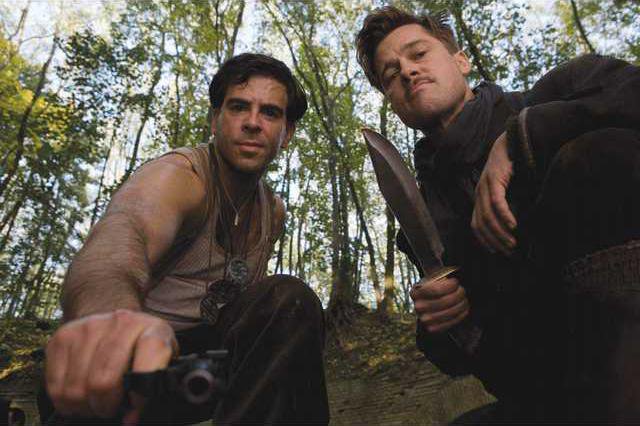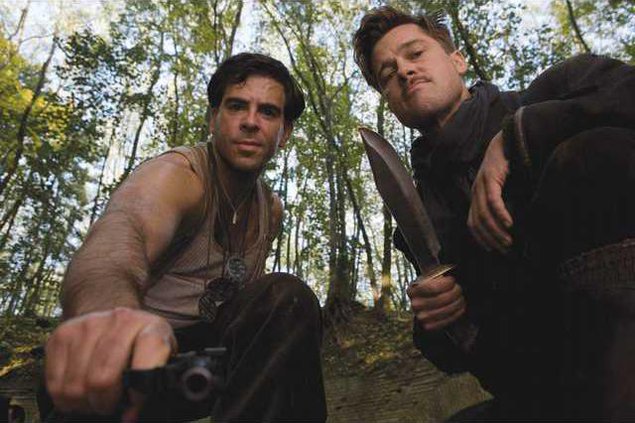Starring: Brad Pitt, B.J. Novak, Mélanie Laurent, Christoph Waltz, Eli Roth
Rated: R for strong graphic violence, language and brief sexuality
Running time: 153 minutes
Bottom line: Not worthy of consideration
Quentin Tarantino’s films have been called many things: brilliant, self-indulgent, operatic, ultra-violent, hyperkinetic, irresponsible, and more. But never has Tarantino been boring. Until now.
“Inglourious Basterds” drags us tediously through more than two and a half hours of revenge fantasies about Jews killing Nazis, rewriting the entire history of World War II in the process. Tarantino’s films always tell elaborate stories and integrate a range of visual styles, but this is the first time that it doesn’t all gel into a unified film. This is the first time, in fact, that Tarantino doesn’t seem in control of his craft.
“Inglourious Basterds” is named, á la “The Dirty Dozen,” after a group of Jewish-American soldiers whose sole raison d’etre is to strike fear into the hearts of Nazis. Lead, ironically, by gentile commander Lt. Aldo Ray (Brad Pitt), the Basterds kill and scalp all Nazis they encounter, except for a few whom they set free. However, they mark those lucky survivors by carving swastikas in their foreheads so the world will always know they were Nazis.
One of the group, Sgt. Donny Donowitz (a wretched Eli Roth) becomes known as the Bear Jew for the way he beats Nazis to death with a baseball bat. Another, Sgt. Hugo Stiglitz (Til Schweiger), defected from the German army, but only after killing a baker’s dozen of Nazi officers.
We know absolutely nothing about the rest of the Basterds, which means the only reason to care about these guys is that they kill Nazis. Turns out, that isn’t very endearing.
The most fearsome Nazi in the film (which is saying something since Goebbels and Hitler both show up) is Hans Landa (Christoph Waltz), dubbed the Jew Hunter for his ability to track down Jews and those who aid them. Landa’s most effective method is the interrogation.
The film opens with Landa questioning a French dairy farmer (Denis Menochet), who is, sure enough, hiding Jews who used to be his neighbors. Landa’s soldiers gun down the entire Jewish family except for an 18-year old daughter named Shosanna. In the first of many nonsensical turns, Shosanna runs out of the house and even though Landa has a clear shot at her, he lets her go.
Four years later, Shosanna (Mélanie Laurent) now calls herself Emanuelle and runs a Parisian cinema she inherited from her aunt and uncle. Frederick Zoller (Daniel Brühl), a handsome German war hero, attempts to woo Shosanna, which forces her to interact with the very Nazis who killed her family. They would of course kill her if they discovered she is a Jewish fugitive.
What do these stories have to do with each other? Nothing other than everything climaxes in the same place.
“Inglourious Basterds” looks like two or three films crammed haphazardly into one, too. The scenes featuring the Basterds sometimes look like Tarantino in Blaxploitation mode, but not always. For instance, when we meet Stiglitz, Tarantino holds on a freeze frame of the character and superimposes “Stiglitz” over the image in lettering reminiscent of “Foxy Brown” or “The Electric Company.” We then launch into a flashback telling us of Stiglitz’ Nazi-killing exploits while Samuel Jackson narrates in voice-over.
None of the other characters gets such an introduction. At no other point does Tarantino use voice-over narration. For two minutes it seems like someone slipped in a reel from a completely different movie.
The Landa and Shosanna stories, meanwhile, look like any ho-hum World War II movie and bear no resemblance to the Basterds’ story.
Waltz has received much-deserverd praise for his portrayal of Landa, but we sit through five Landa interrogation scenes that take interminably long to develop.
Tarantino has always excelled at developing scenes so agonizingly slowly that they reach operatic scale. Here, though, we know exactly how the scenes are going to end, and there is none of the dark humor or spectacular violence that usually makes us relish the slow build up.
All this amounts to a painfully long film that is juvenile in conception, clumsy in execution and would garner no attention at all if it didn’t bear the name “Tarantino.”
Jeff Marker is a media studies professor at Gainesville State College.

